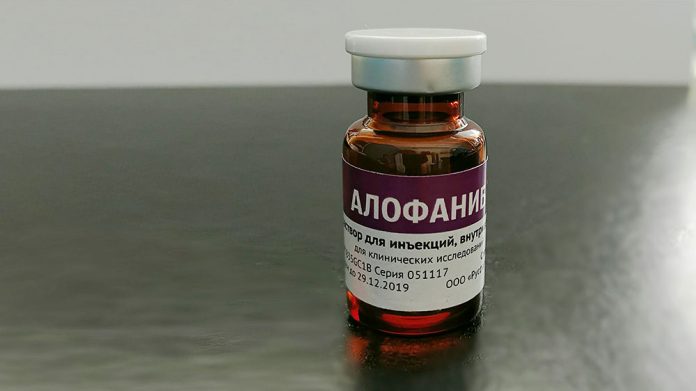Alofanib helped to stop the development of the disease in 70% of patients. Such data were obtained during a clinical trial of an innovative anti-cancer drug developed by Ruspharmtech, Skolkovo resident (VEB.RF Group), in patients with metastatic stomach cancer.
In a multicenter phase 1b clinical trial, the first to be conducted in humans, the toxicity of various doses of the drug, pharmacokinetics and efficacy were evaluated. The allosteric inhibitor of fibroblast growth factor receptor type 2 (FGFR2), Alofanib, is the first original targeted drug in Russian oncology that entered clinical trials in patients with solid tumours.
Alofanib helped to stop the progression of the disease in 68.4% of patients and also led to a significant reduction in tumour mass even at the initial dose (50 mg/m2) with a duration of disease control of 18.5 months. Patients with liver metastases, which are considered an unfavourable prognostic factor, also had a treatment effect comparable to that of the general group. The median life expectancy of all patients at the first dose level was 12.6 months.
[expert_review params=”JTdCJTIyY29sb3IlMjIlM0ElMjJibHVlLTElMjIlMkMlMjJleHBlcnRfYXZhdGFyJTIyJTNBJTIyaHR0cHMlM0ElMkYlMkZwaGFybXByb20ubmV0JTJGd3AtY29udGVudCUyRnVwbG9hZHMlMkZ0aW1vZmVldi5qcGclMjIlMkMlMjJleHBlcnRfbmFtZSUyMiUzQSUyMklseWElMjBUaW1vZmVldiUyMiUyQyUyMmV4cGVydF9saW5rJTIyJTNBJTIyJTIyJTJDJTIyZXhwZXJ0X2lkJTIyJTNBJTIyJTIyJTJDJTIyZXhwZXJ0X3R5cGUlMjIlM0ElMjJzZWxmJTIyJTJDJTIyZXhwZXJ0X2F2YXRhcl9hbHQlMjIlM0ElMjIlMjIlMkMlMjJleHBlcnRfc2hvdyUyMiUzQTElMkMlMjJleHBlcnRfZGVzY3JpcHRpb24lMjIlM0ElMjIlMjBkaXJlY3RvciUyMG9mJTIwdGhlJTIwQnVyZWF1JTIwZm9yJTIwQ2FuY2VyJTIwUmVzZWFyY2glMkMlMjBtZW1iZXIlMjBvZiUyMHRoZSUyMEFTQ08lMjBJbnRlcm5hdGlvbmFsJTIwR3JvdXAlMkMlMjBvbmUlMjBvZiUyMHRoZSUyMGF1dGhvcnMlMjBvZiUyMHRoZSUyMHN0dWR5JTIwb2YlMjB0aGUlMjBkcnVnJTIyJTJDJTIyZXhwZXJ0X3Nob3dfYnV0dG9uJTIyJTNBMCUyQyUyMmV4cGVydF9zaG93X2J1dHRvbl90eXBlJTIyJTNBJTIycG9wdXAlMjIlMkMlMjJleHBlcnRfcXVlc3Rpb25fYnV0dG9uX3RleHQlMjIlM0ElMjJBc2slMjBRdWVzdGlvbiUyMiUyQyUyMnF1ZXN0aW9uX2V4dGVybmFsX2xpbmslMjIlM0ElMjIlMjIlMkMlMjJwb3B1cF91c2VfcGhvbmUlMjIlM0EwJTJDJTIyZXhwZXJ0X3RpdGxlJTIyJTNBJTIyJTIyJTJDJTIyZXhwZXJ0X3Nob3dfdGl0bGUlMjIlM0EwJTJDJTIyZXhwZXJ0X3RleHQlMjIlM0ElMjJBY2NvcmRpbmclMjB0byUyMHN0YXRpc3RpY3MlMkMlMjBzdG9tYWNoJTIwY2FuY2VyJTIwaXMlMjBpbiUyMHRoZSUyMFRPUC01JTIwbW9zdCUyMGNvbW1vbiUyMG1hbGlnbmFudCUyMG5lb3BsYXNtcyUyMGluJTIwUnVzc2lhJTIwaW4lMjB0ZXJtcyUyMG9mJTIwaW5jaWRlbmNlJTIwYW5kJTIwbW9ydGFsaXR5LiUyMFRoaXMlMjB0dW1vdXIlMjBoYXMlMjBhbiUyMHVuZmF2b3VyYWJsZSUyMGNvdXJzZSUyMGFuZCUyMGElMjBsYXJnZSUyMG51bWJlciUyMG9mJTIwcGF0aWVudHMlMjBhcmUlMjBhdCUyMHRoZSUyMHN0YWdlJTIwb2YlMjBtZXRhc3Rhc2lzLiUyMDUteWVhciUyMGxpZmUlMjBleHBlY3RhbmN5JTJDJTIwaW4lMjB0aGlzJTIwY2FzZSUyQyUyMGRvZXMlMjBub3QlMjBleGNlZWQlMjA1LjUlMjUuJTIwVGhlJTIwc3VjY2VzcyUyMG9mJTIwdGhlcmFweSUyMGlzJTIwYXNzb2NpYXRlZCUyMHdpdGglMjBlYXJseSUyMGxpbmVzJTJDJTIwYW5kJTIwaW4lMjB0aGUlMjBjYXNlJTIwb2YlMjBkaXNlYXNlJTIwcHJvZ3Jlc3Npb24lMjBhZnRlciUyMHN0YW5kYXJkJTIwdHJlYXRtZW50JTJDJTIwdGhlJTIwbWVkaWFuJTIwbGlmZSUyMGV4cGVjdGFuY3klMjBkcm9wcyUyMHRvJTIwNC01JTIwbW9udGhzLiUyMFdlJTIwYmVsaWV2ZSUyMHRoYXQlMjB0aGUlMjByZXN1bHRzJTIwb2YlMjB0aGUlMjBwaGFzZSUyMDFiJTIwY2xpbmljYWwlMjB0cmlhbCUyMGFsbG93JTIwdXMlMjB0byUyMGNvbnRpbnVlJTIwdGhlJTIwc3R1ZHklMjBvZiUyMEFsb2ZhbmliJTIwaW4lMjBhJTIwcGhhc2UlMjAyJTIwcmVnaXN0cmF0aW9uJTIwY2xpbmljYWwlMjB0cmlhbCUyMGluJTIwcGF0aWVudHMlMjB3aXRoJTIwbWV0YXN0YXRpYyUyMHN0b21hY2glMjBjYW5jZXIuJTIwVGhlJTIwZHJ1ZyUyMHdhcyUyMHdlbGwlMjB0b2xlcmF0ZWQlMkMlMjBub25lJTIwb2YlMjB0aGUlMjBwYXRpZW50cyUyMHdpdGhkcmV3JTIwY29uc2VudCUyMGR1ZSUyMHRvJTIwdG9sZXJhYmlsaXR5JTIwYW5kJTIwdGhlJTIwbW9kZSUyMG9mJTIwYWRtaW5pc3RyYXRpb24lMjBvZiUyMEFsb2ZhbmliLiUyMEFsc28lMkMlMjB0aGUlMjBmaXJzdCUyMHNpZ25hbHMlMjBvZiUyMHRoZSUyMGVmZmVjdGl2ZW5lc3MlMjBvZiUyMHRoZSUyMGRydWclMjBpbiUyMHBhdGllbnRzJTIwd2hvJTIwaGF2ZSUyMGV4aGF1c3RlZCUyMHRoZSUyMHJlc291cmNlJTIwb2YlMjB0cmVhdG1lbnQlMjB3ZXJlJTIwbm90ZS4lMjIlMkMlMjJxYSUyMiUzQSU1QiU1RCUyQyUyMnFhX3Nob3dfdGl0bGUlMjIlM0ExJTJDJTIycWFfdGl0bGUlMjIlM0ElMjJRdWVzdGlvbnMlMjB0byUyMHRoZSUyMGV4cGVydCUyMiUyQyUyMnNjb3JlJTIyJTNBJTVCJTVEJTJDJTIyc2NvcmVfc3VtbWFyeV90ZXh0JTIyJTNBJTIyJTIyJTJDJTIyc2NvcmVfc3VtbWFyeV9hdmVyYWdlJTIyJTNBMCUyQyUyMnNjb3JlX21heCUyMiUzQSUyMjUlMjIlMkMlMjJzY29yZV9zeW1ib2wlMjIlM0ElMjIlMjIlMkMlMjJzY29yZV90aXRsZSUyMiUzQSUyMiUyMiUyQyUyMnNjb3JlX3Nob3dfdGl0bGUlMjIlM0EwJTJDJTIycGx1c2VzJTIyJTNBJTVCJTVEJTJDJTIybWludXNlcyUyMiUzQSU1QiU1RCUyQyUyMnBsdXNlc19taW51c2VzX3Nob3dfdGl0bGUlMjIlM0ExJTJDJTIycGx1c2VzX21pbnVzZXNfdGl0bGUlMjIlM0ElMjJQbHVzJTIwJTI2JTIwTWludXMlMjIlMkMlMjJwbHVzZXNfdGl0bGUlMjIlM0ElMjIlMjIlMkMlMjJtaW51c2VzX3RpdGxlJTIyJTNBJTIyJTIyJTdE”]The patients included in the study had gastric adenocarcinoma with multiple metastases to various organs, including the liver and bones. Previous attempts at chemotherapy, modern standard targeted therapy and immunotherapy were unsuccessful – the tumour continued to spread, the patients’ health deteriorated. In this state, patients began to receive intravenous administration of Alofanib.
[expert_review params=”JTdCJTIyY29sb3IlMjIlM0ElMjJibHVlLTElMjIlMkMlMjJleHBlcnRfYXZhdGFyJTIyJTNBJTIyaHR0cHMlM0ElMkYlMkZwaGFybXByb20ubmV0JTJGd3AtY29udGVudCUyRnVwbG9hZHMlMkZrYWVtLmpwZyUyMiUyQyUyMmV4cGVydF9uYW1lJTIyJTNBJTIyS2lyaWxsJTIwS2FlbSUyMiUyQyUyMmV4cGVydF9saW5rJTIyJTNBJTIyJTIyJTJDJTIyZXhwZXJ0X2lkJTIyJTNBJTIyJTIyJTJDJTIyZXhwZXJ0X3R5cGUlMjIlM0ElMjJzZWxmJTIyJTJDJTIyZXhwZXJ0X2F2YXRhcl9hbHQlMjIlM0ElMjIlMjIlMkMlMjJleHBlcnRfc2hvdyUyMiUzQTElMkMlMjJleHBlcnRfZGVzY3JpcHRpb24lMjIlM0ElMjIlMjBTZW5pb3IlMjBWaWNlJTIwUHJlc2lkZW50JTIwZm9yJTIwSW5ub3ZhdGlvbiUyMGF0JTIwdGhlJTIwU2tvbGtvdm8lMjBGb3VuZGF0aW9uJTIyJTJDJTIyZXhwZXJ0X3Nob3dfYnV0dG9uJTIyJTNBMCUyQyUyMmV4cGVydF9zaG93X2J1dHRvbl90eXBlJTIyJTNBJTIycG9wdXAlMjIlMkMlMjJleHBlcnRfcXVlc3Rpb25fYnV0dG9uX3RleHQlMjIlM0ElMjJBc2slMjBRdWVzdGlvbiUyMiUyQyUyMnF1ZXN0aW9uX2V4dGVybmFsX2xpbmslMjIlM0ElMjIlMjIlMkMlMjJwb3B1cF91c2VfcGhvbmUlMjIlM0EwJTJDJTIyZXhwZXJ0X3RpdGxlJTIyJTNBJTIyJTIyJTJDJTIyZXhwZXJ0X3Nob3dfdGl0bGUlMjIlM0EwJTJDJTIyZXhwZXJ0X3RleHQlMjIlM0ElMjJTdXBwb3J0JTIwZm9yJTIwdGhlJTIwZGV2ZWxvcG1lbnQlMjBvZiUyMGlubm92YXRpdmUlMjBkcnVncyUyMGluJTIwdGhlJTIwZmllbGQlMjBvZiUyMGNhbmNlciUyMHRoZXJhcHklMjBpcyUyMG9uZSUyMG9mJTIwU2tvbGtvdm8ncyUyMGtleSUyMHByaW9yaXRpZXMuJTIwVXNpbmclMjB0aGUlMjBjbGFzc2ljYWwlMjBhcHByb2FjaCUyMHRvJTIwdGhlJTIwZGV2ZWxvcG1lbnQlMjBvZiUyMGElMjBjaGVtaWNhbCUyMGRydWclMjAoc21hbGwlMjBtb2xlY3VsZSklMkMlMjBjb2xsZWFndWVzJTIwYXQlMjBSdXNwaGFybXRlY2glMjBoYXZlJTIwY3JlYXRlZCUyMGFuJTIwaW5ub3ZhdGl2ZSUyMGRydWcuJTIwSXQlMjBoZWxwcyUyMG5vdCUyMG9ubHklMjB0byUyMGJsb2NrJTIwdGhlJTIwY29uc3RhbnRseSUyMG11dGF0aW5nJTIwcmVjZXB0b3JzJTIwb2YlMjBjYW5jZXIlMjBjZWxscyUyMGJ1dCUyMHRvJTIwdHdpc3QlMjB0aGVtJTJDJTIwd2hpY2glMjBhbGxvd3MlMjB0aGUlMjBkcnVnJTIwdG8lMjBhY3QlMjBvbiUyMHRoZSUyMHR1bW91ciUyMGRlc3BpdGUlMjB0aGUlMjBtdXRhdGlvbnMuJTIwV2UlMjBhcmUlMjBwcm91ZCUyMG9mJTIwdGhlJTIwcmVzdWx0cyUyMG9mJTIwb3VyJTIwcmVzaWRlbnQncyUyMGNsaW5pY2FsJTIwdHJpYWxzJTJDJTIwYXMlMjBBbG9mYW5pYiUyMGlzJTIwYWxyZWFkeSUyMHByb2xvbmdpbmclMjB0aGUlMjBsaWZlJTIwb2YlMjBwYXRpZW50cyUyMHdoZW4lMjBvdGhlciUyMGRydWdzJTIwaGF2ZSUyMGZhaWxlZC4lMjIlMkMlMjJxYSUyMiUzQSU1QiU1RCUyQyUyMnFhX3Nob3dfdGl0bGUlMjIlM0ExJTJDJTIycWFfdGl0bGUlMjIlM0ElMjJRdWVzdGlvbnMlMjB0byUyMHRoZSUyMGV4cGVydCUyMiUyQyUyMnNjb3JlJTIyJTNBJTVCJTVEJTJDJTIyc2NvcmVfc3VtbWFyeV90ZXh0JTIyJTNBJTIyJTIyJTJDJTIyc2NvcmVfc3VtbWFyeV9hdmVyYWdlJTIyJTNBMCUyQyUyMnNjb3JlX21heCUyMiUzQSUyMjUlMjIlMkMlMjJzY29yZV9zeW1ib2wlMjIlM0ElMjIlMjIlMkMlMjJzY29yZV90aXRsZSUyMiUzQSUyMiUyMiUyQyUyMnNjb3JlX3Nob3dfdGl0bGUlMjIlM0EwJTJDJTIycGx1c2VzJTIyJTNBJTVCJTVEJTJDJTIybWludXNlcyUyMiUzQSU1QiU1RCUyQyUyMnBsdXNlc19taW51c2VzX3Nob3dfdGl0bGUlMjIlM0ExJTJDJTIycGx1c2VzX21pbnVzZXNfdGl0bGUlMjIlM0ElMjJQbHVzJTIwJTI2JTIwTWludXMlMjIlMkMlMjJwbHVzZXNfdGl0bGUlMjIlM0ElMjIlMjIlMkMlMjJtaW51c2VzX3RpdGxlJTIyJTNBJTIyJTIyJTdE”]Alofanib therapy was well tolerated, with 71.4% of patients experiencing treatment-related side effects. More pronounced toxicity grade 3-4 according to CTCAE criteria was observed only in 6 patients (28.6%) and was not related to the dose level. The maximum tolerated dose has not been reached, so future trials will start with Alofanib at a dose of 350 mg/m2.

